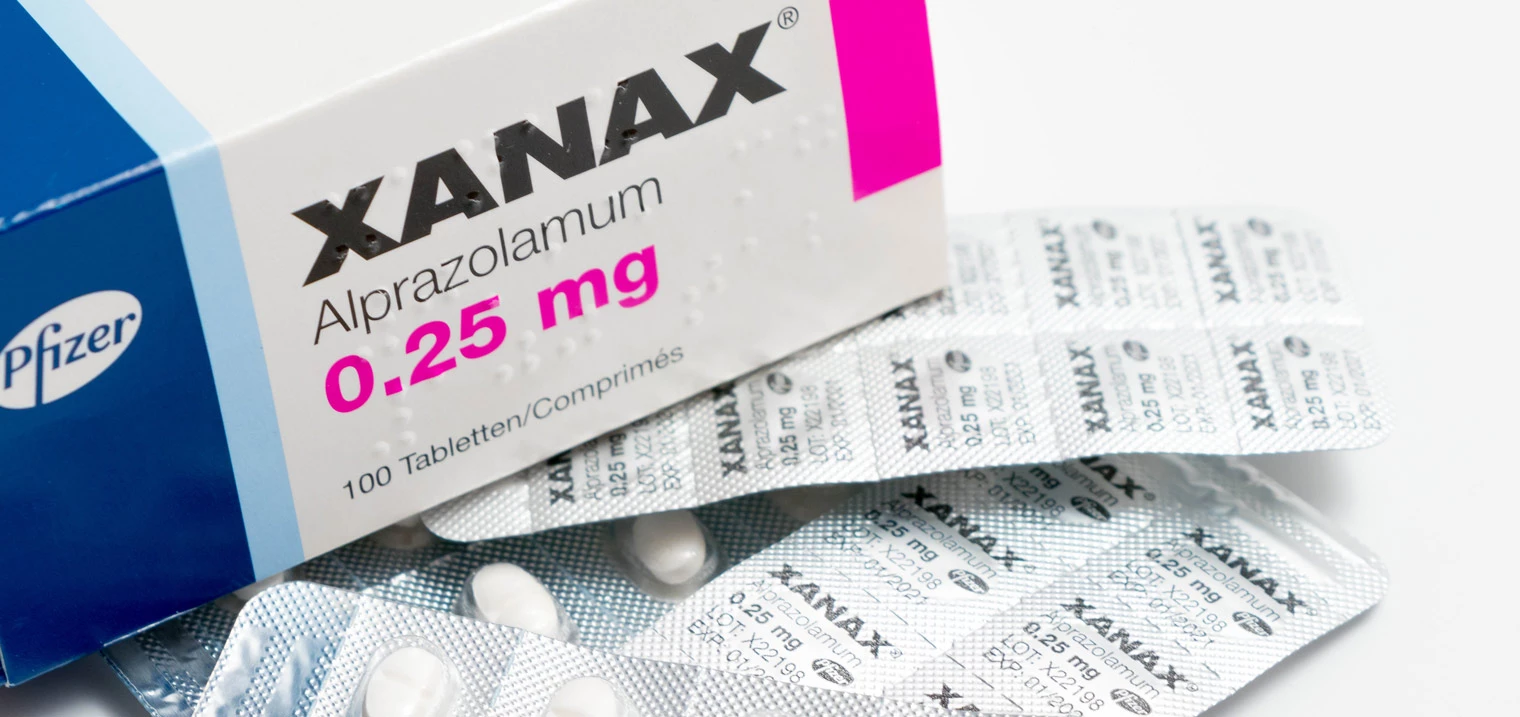How Long Does It Take to Get Addicted to Xanax?
Looking at the Path to Xanax Dependence and Recovery
Do you or a loved one take Xanax? The thought of becoming addicted to Xanax is a scary one. But how long does this take? In this blog, we answer how long does it take to get addicted to Xanax and others related to the Xanax addiction process.
If you or a loved one are struggling, you are not alone. Icarus in Nevada has helped many clients achieve lasting recovery from anxiety medication, and we are here to support you.
If you’re worried that you are addicted to Xanax or may be becoming addicted, keep reading to learn more about dependence on the drug, as well as find out about effective programs of treatment offered at Icarus Behavioral Health in Nevada!
Becoming Hooked on Xanax: How Does it Happen?

Xanax is used by millions of people around the world, mainly for anxiety disorders and insomnia. And while some people can take this drug without getting hooked, many others become terribly dependent.
If you are reading this article, you may already be aware of the dangers of this substance, and just how difficult the withdrawals and breaking dependence can be!
Physical dependence can happen regardless of whether you take prescribed Xanax or street Xanax, and it is worth noting that many prescription medications sold illicitly in the US are counterfeit, and can result in cross addiction to other substances, primarily fentanyl.
Get Immediate Help For Xanax – Reach Out Now!
The Timeline of Benzodiazepine Use Disorders
Let’s get down to it: how long does it take to get addicted to Xanax? Whether you start taking Xanax through Xanax prescriptions or street Xanax, addiction takes time to happen. The timeline for each person varies and depends on a number of factors including genetics, underlying mental illnesses, childhood environment, and any trauma you may have been the victim of.
Xanax addiction does follow a similar pattern, though.
If you’re dealing with anxiety or another mental illness and are considering using Xanax, you should understand the risks associated with this drug before trying it. Xanax abuse can lead to Xanax overdose, and even withdrawal from Xanax can cause death.
Here’s a timeline of how Xanax addiction can develop.
- Short-term use
People take Xanax in small doses, believing it will relieve their anxious feelings quickly. While this might be true in the short term, long-term Xanax use can lead to tolerance and dependence.
- Tolerance
If you use Xanax for longer periods of time, your body begins to build up a tolerance to it. This means you need to use higher dosages to achieve the same effect as when you first started using it. As your use increases, so does the risk of developing an addiction.
- Dependence
If you’ve been using Xanax for a long time, you may become dependent on it in order to cope with anxiety. This means that if you try to quit, you’ll experience intense withdrawal symptoms such as mood swings, panic disorders, and increased anxiety.
- Addiction
When someone is dependent on Xanax, they can become addicted to it. This means they continue to take it, even when there are negative consequences, such as health problems or financial difficulties. The road from Xanax addiction is a hard one, but you can get clean and live the life you want, free from drugs.
For more information on how to do this, contact our caring team at Icarus Behavioral Health in Nevada and get proven treatment options today.
What are the Typical Xanax Withdrawal Symptoms?

Xanax discontinuation causes withdrawal symptoms. The timeline and intensity of these withdrawals vary depending on how long you have been using the drug, as well as underlying medical issues or co-occurring mental health disorders.
The severity level of withdrawal symptoms varies from one person to another. However, there are some common Xanax withdrawal symptoms that most people who are quitting the drug will experience.
Generally speaking, Xanax withdrawal symptoms begin around a day after your last dose and may include anxiety, depression, irritability, difficulty concentrating or focusing, muscle tension, nausea, vomiting, fatigue, insomnia, restlessness, or agitation. You may also experience severe cravings for Xanax and be tempted to start using the drug again.
Delerium Tremens From Xanax Withdrawal
In addition to these common symptoms of withdrawal from Xanax, some people may also experience seizures or delirium tremens (DTs). Seizures are more common in people who have been abusing Xanax for a long period of time and are dependent on it. DTs are an intense state of confusion or mental instability that often happens as a result of alcohol withdrawal, but it is also possible to experience DTs from quitting benzodiazepines such as Xanax.
Some people experience withdrawal symptoms as early as a few hours after their last dose, while for others it can take several days before they start to feel the full effects of withdrawal. Generally speaking, most people feel better within two weeks of quitting Xanax. Note that there may be a period of post-acute withdrawal following the acute stage.
Xanax withdrawal is often a deeply challenging and uncomfortable process. If you are trying to quit using, you need to have a strong support system in place as well as medical supervision from a qualified professional. At Icarus Nevada, we can safely and comfortably detox you from Xanax, and give you the information you need to make sure you can stop taking Xanax for good.
24 Hour Substance Abuse Rehab Helpline – Call Now!
The Relationship Between Xanax And Mental Illness
The combination of Xanax addiction and mental illness can make each other worse. When someone has a mental illness, Xanax may relieve them of their symptoms for a while, but these symptoms always come back.
And when people get addicted to Xanax, their continual use can make symptoms of mental illness worse. It’s a truly vicious cycle, but one that can be overcome with our dual diagnosis treatment programs at Icarus.
Depression and Xanax Addiction
Depression is one of the most common mental illnesses in the world, and unfortunately, it often goes hand-in-hand with Xanax addiction. People who suffer from depression are more likely to use drugs like Xanax in an attempt to self-medicate and ease their symptoms.
Again, this can lead to cycles of abuse, where a person becomes increasingly dependent on the drug, which only exacerbates their depression.
Anxiety Disorders, Panic Disorder and Xanax Addiction

Anxiety and panic disorder are also mental illnesses that can be influenced by Xanax addiction. Just like depression, people with anxiety or panic often turn to benzodiazepines to feel relief from their symptoms. The drug’s calming and sedative effects can offer temporary respite from the intense stress and worry associated with generalized anxiety disorder and other disorders.
However, just as with depression, this can lead to an addiction if the person begins Xanax substance abuse. This can also have a negative impact on their mental health, as they may find themselves in a cycle of self-medication, followed by withdrawal and increased anxiety.
PTSD and Xanax Addiction
Post Traumatic Stress Disorder (PTSD) is another mental illness that can be affected by Xanax addiction. People with PTSD often experience intense anxiety, nightmares, flashbacks, and other symptoms that make it difficult to cope.
Unfortunately, benzodiazepines like Xanax can provide temporary relief from these symptoms, leading some people to become dependent on or addicted to the drug. These people are effectively stuck taking Xanax to treat these PTSD symptoms.
Just like depression and anxiety, an addiction to Xanax can actually worsen the symptoms of PTSD, as well as lead to serious side effects like confusion, memory problems, and difficulty concentrating. For this reason, if you have PTSD it is even more important to get professional help if you feel you may be developing an addiction.
BPD and Xanax Addiction
Borderline Personality Disorder (BPD) is a mental illness characterized by intense emotions, impulsive behaviors, and relationship difficulties. Unfortunately, people with BPD are also at risk of developing an addiction to benzodiazepines like Xanax due to the negative coping mechanisms they may employ in order to manage their symptoms. Xanax’s sedative effects can make it difficult for someone with BPD to remain in control of their emotions and actions.
As with any mental illness, addiction to Xanax can actually worsen the symptoms of BPD. If you are addicted to Xanax and have BPD, it is time to get help. This may include attending therapy, taking medication prescribed by a doctor, and engaging in healthy coping strategies. Of course, getting treatment at Icarus Behavioral Health in Nevada is always the most effective way of getting clean from Xanax.
When it comes to treating anxiety, many people turn to Xanax as a quick fix. But while the drug might bring temporary relief from anxious feelings, it can also have serious consequences if used in the long term.
Get Immediate Help For Substance Abuse – Reach Out Now!
How To Treat Anxiety Without Xanax
Keep in mind that Xanax is an addictive drug and should not be used for long-term treatment of anxiety. If you’re struggling with anxiety, there are other ways to manage your symptoms without relying on medications like Xanax.
One way to treat anxiety without the use of drugs is through counseling or therapy. A therapist can help you identify and address the underlying causes of your anxiety, as well as learn coping skills that may reduce the intensity of anxious feelings. Cognitive Behavioral Therapy (CBT) is a form of talk therapy that has been proven effective in treating anxiety disorders.
Another way to manage anxiety without drugs is with lifestyle changes, such as exercising regularly, eating a balanced diet, and getting enough sleep each night. These changes can help reduce the symptoms of anxiety and make it easier to cope with stressors in your life.
Natural remedies like herbs and supplements may also be helpful in reducing anxiety. Herbs such as passionflower, chamomile, and kava are natural relaxants that can help reduce feelings of stress and anxiety. Supplements like omega-3 fatty acids, probiotics, and B vitamins may also be beneficial in reducing symptoms of anxiety. Be aware that some supplements can be addictive. It is better to speak with a professional at Icarus Behavioral Health before starting a supplement regime for anxiety.
Using Xanax With Other Substances

Xanax addiction is a severe issue that requires immediate attention, whether it is an addiction to prescription Xanax or street Xanax. Unfortunately, many people don’t realize the dangers of combining Xanax with alcohol or other drugs.
Mixing these substances can have dangerous effects—both short-term and long-term—on the user’s mental and physical health.
- Short-term Dangers: When it comes to short-term dangers, the most common side effect of mixing Xanax with other drugs or alcohol is extreme drowsiness. This can lead to impaired judgment and cause individuals to engage in risky behavior while under the influence. Taking too much Xanax can result in difficulty breathing, decreased heart rate, loss of consciousness, and potentially death.
- Long-term Dangers: People who become addicted to Xanax and mix it with other drugs or alcohol can experience serious long-term effects. Mixing these substances can cause you to become increasingly tolerant of the drug, which can lead to higher doses being needed for the same effect. This increases the risk of overdose and other dangerous side effects. Chronic users may also be more likely to suffer from depression, anxiety, and other mental health issues.
The best way to prevent the dangers associated with Xanax addiction is to avoid using it altogether. If you or someone you know is struggling with this problem, we have resources available to help.
Icarus Behavioral Health in Nevada can support you or your loved one with assistance in overcoming their addiction and taking steps to get better.
Most Private Health Insurances Accepted – Reach Out Now!
Get Support to Overcome Xanax Dependence Today
Have you been taking Xanax and fear you will soon be addicted? Xanax addiction is extremely unpleasant, and once you are in it it can seem impossible to pull yourself. Fortunately, there is help in the form of our Xanax rehab program.
At Icarus in Nevada, we will give you a medical detox so you can detox safely and comfortably. Once we have done this, you will be supported through the formative stages of Xanax recovery. We will help you get to the root of your addiction to Xanax use, meaning you can stay stopped for good.
For more information on how we can help you or a loved one overcome Xanax addiction, contact us today for a confidential consultation and to get support options now!











